Publish Date: May 31, 2024 | Keywords: Cognition, Contemporary EHF 2024, Healthcare, Publications, Safety
| Document
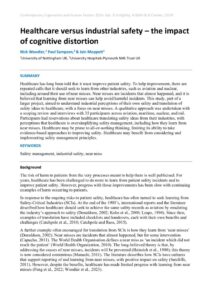
|
Author
Nick Woodier, Paul Sampson, & Iain Moppett |
Abstract
Healthcare has long been told that it must improve patient safety. To help improvement, there are repeated calls that it should seek to learn from other industries, such as aviation and nuclear, including around their use of near misses. Near misses are incidents that almost happened, and it is believed that learning from near misses can help avoid harmful incidents. This study, part of a larger project, aimed to understand industrial perceptions of their own safety and translation of safety ideas to healthcare, with a focus on near misses. A qualitative approach was undertaken with a scoping review and interviews with 35 participants across aviation, maritime, nuclear, and rail. Participants had reservations about healthcare translating safety ideas from their industries, with perceptions that healthcare is oversimplifying safety management, including how they learn from near misses. Healthcare may be prone to all-or-nothing thinking, limiting its ability to take evidence-based approaches to improving safety. Healthcare may benefit from considering and implementing safety management principles. |
Publish Date: May 31, 2024 | Keywords: Contemporary EHF 2024, Ergonomics, Healthcare, Human factors integration, Publications
| Document
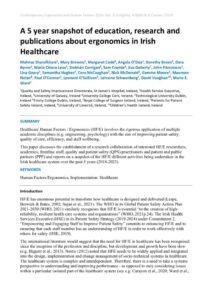
|
Author
Mahnaz Sharafkhani, Mary Browne, Margaret Codd, Angela O’Dea, Dorothy Breen, Dara Byrne, Maria Chiara Leva, Siobhán Corrigan, Sam Cromie, Eva Doherty, John Fitzsimons, Una Geary, Samantha Hughes, Cora McCaughan, Nick McDonald, Gemma Moore, Maureen Nolan, Paul O’Connor, Leonard O’Sullivan, Lorraine Schwanberg, David Vaughan, Marie E. Ward |
Abstract
Healthcare Human Factors / Ergonomics (HF/E) involves the rigorous application of multiple academic disciplines (e.g. engineering, psychology) with the aim of improving patient safety, quality of care, efficiency, and staff wellbeing. This paper discusses the establishment of a research collaboration of interested HF/E researchers, academics, frontline staff, quality and patient safety (QPS) practitioners and patient and public partners (PPP) and reports on a snapshot of the HF/E different activities being undertaken in the Irish healthcare system over the past 5 years (2018-2023). |
Publish Date: May 31, 2024 | Keywords: Contemporary EHF 2024, Publications, Rail, Technology, Transportation
| Document
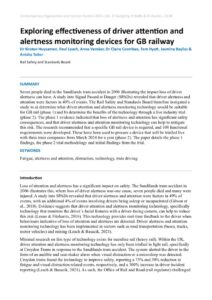
|
Author
Dr Kirsten Huysamen, Paul Leach, Anna Vereker, Dr Claire Coombes, Tom Hyat, Jasmine Bayliss & Anisha Tailor |
Abstract
Seven people died in the Sandilands tram accident in 2006 illustrating the impact loss of driver alertness can have. A study into Signal Passed at Danger (SPADs) revealed that driver alertness and attention were factors in 49% of events. The Rail Safety and Standards Board therefore instigated a study to a) determine what driver attention and alertness monitoring technology would be suitable for GB rail (phase 1) and b) determine the benefits of the technology through a live industry trial (phase 2). The phase 1 evidence indicated that loss of alertness and attention has significant safety consequences, and that driver alertness and attention monitoring technology can help to mitigate this risk. The research recommended that a specific GB rail device is required, and 108 functional requirements were developed. These have been used to procure a device that will be trialled live with three train companies from March 2024 for a year (phase 2). The paper details the phase 1 findings, the phase 2 trial methodology and initial findings from the trial. |
Publish Date: May 31, 2024 | Keywords: Accessibility, Contemporary EHF 2024, Publications, Rail, Transportation
| Document
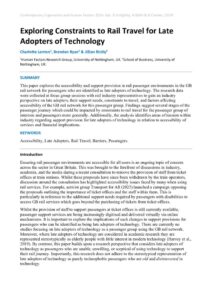
|
Author
Charlotte Lenton, Brendan Ryan & Jillian Rickly |
Abstract
This paper explores the accessibility and support provision in rail passenger environments in the GB rail network for passengers who are identified as late adopters of technology. The research data were collected at focus group sessions with rail industry representatives to gain an industry perspective on late adopters, their support needs, constraints to travel, and factors affecting accessibility of the GB rail network for this passenger group. Findings suggest several stages of the passenger journey which could be impacted by constraints to rail travel for the passenger group of interests and passengers more generally. Additionally, the analysis identifies areas of tension within industry regarding support provision for late adopters of technology in relation to accessibility of services and financial implications. |
Publish Date: May 31, 2024 | Keywords: Contemporary EHF 2024, Publications, Technology
| Document
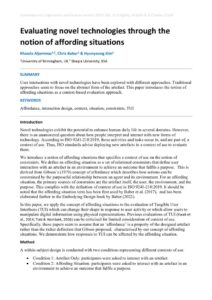
|
Author
Khawla Aljammaz, Chris Baber & Hyunyoung Kim |
Abstract
User interactions with novel technologies have been explored with different approaches. Traditional approaches seem to focus on the abstract form of the artefact. This paper introduces the notion of affording situations as a context-based evaluation approach. |





